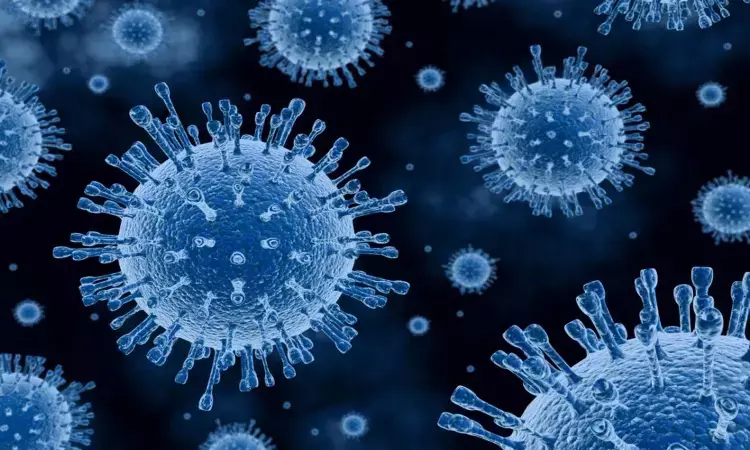- Home
- Medical news & Guidelines
- Anesthesiology
- Cardiology and CTVS
- Critical Care
- Dentistry
- Dermatology
- Diabetes and Endocrinology
- ENT
- Gastroenterology
- Medicine
- Nephrology
- Neurology
- Obstretics-Gynaecology
- Oncology
- Ophthalmology
- Orthopaedics
- Pediatrics-Neonatology
- Psychiatry
- Pulmonology
- Radiology
- Surgery
- Urology
- Laboratory Medicine
- Diet
- Nursing
- Paramedical
- Physiotherapy
- Health news
- Fact Check
- Bone Health Fact Check
- Brain Health Fact Check
- Cancer Related Fact Check
- Child Care Fact Check
- Dental and oral health fact check
- Diabetes and metabolic health fact check
- Diet and Nutrition Fact Check
- Eye and ENT Care Fact Check
- Fitness fact check
- Gut health fact check
- Heart health fact check
- Kidney health fact check
- Medical education fact check
- Men's health fact check
- Respiratory fact check
- Skin and hair care fact check
- Vaccine and Immunization fact check
- Women's health fact check
- AYUSH
- State News
- Andaman and Nicobar Islands
- Andhra Pradesh
- Arunachal Pradesh
- Assam
- Bihar
- Chandigarh
- Chattisgarh
- Dadra and Nagar Haveli
- Daman and Diu
- Delhi
- Goa
- Gujarat
- Haryana
- Himachal Pradesh
- Jammu & Kashmir
- Jharkhand
- Karnataka
- Kerala
- Ladakh
- Lakshadweep
- Madhya Pradesh
- Maharashtra
- Manipur
- Meghalaya
- Mizoram
- Nagaland
- Odisha
- Puducherry
- Punjab
- Rajasthan
- Sikkim
- Tamil Nadu
- Telangana
- Tripura
- Uttar Pradesh
- Uttrakhand
- West Bengal
- Medical Education
- Industry
Lung injury in COVID-19 not like seen in high altitude pulmonary edema

New Rochelle, NY - Experts have refuted that lung injury seen in Covid 19 cases is not similar to one encountered in high altitude pulmonary edema.
A group of researchers with experience in treating high altitude pulmonary edema (HAPE) have written to correct the misconception in medical social media forums and elsewhere that the lung injury seen in COVID-19 is not like typical acute respiratory distress syndrome (ARDS) and is instead like HAPE. COVID-19 lung injury is not like HAPE, and treating it like HAPE could have adverse effects on patient outcomes, according to an article published in High Altitude Medicine & Biology, a peer-reviewed journal from Mary Ann Liebert, Inc., publishers. Click here to read the full-text article free on the High Altitude Medicine & Biology website through May 20, 2020.
The article entitled "COVID-19 Lung Injury Is Not High Altitude Pulmonary Edema" is coauthored by Andrew M. Luks, MD, University of Washington, Seattle, and colleagues from Himalayan Rescue Association, Intermountain Medical Center (Salt Lake City, UT), University of Utah, Salt Lake City, St. Mary's Medical Center, San Francisco (CA), VA Puget Sound Health Care System, Seattle, and University of Colorado Anschutz Medical Campus (Aurora).
The researchers discuss the similarities between HAPE and ARDS, and also highlight the differences between them. ARDS in COVID-19 occurs as a result of an inflammatory response to the presence of the virus, whereas HAPE does not occur as a result of underlying inflammation, but rather as a result of excessive and uneven hypoxic pulmonary vasoconstriction. Understanding the different mechanisms of HAPE and ARDS is critical for patient management because the treatment for each will be quite different. Long-term supportive care including mechanical ventilation may be needed to overcome the underlying inflammation in COVID-19.
"It is vitally important to not equate these two diseases simply because they share some similarities in their radiologic appearance and cause hypoxemia (low blood oxygen content). This can be said for many other acute lung injuries. Any perceived link of HAPE to COVID-19 lung injury could have deleterious consequences if the same medications useful in HAPE were tried in those with COVID-19 related respiratory failure," says Erik R. Swenson, MD, Editor-in-Chief of High Altitude Medicine & Biology and Professor of Medicine, University of Washington and Division of Pulmonary and Critical Care Medicine, Veterans Administration Puget Sound Healthcare System.
For more details click on the link: http://dx.doi.org/10.1089/ham.2020.0055
Hina Zahid Joined Medical Dialogue in 2017 with a passion to work as a Reporter. She coordinates with various national and international journals and association and covers all the stories related to Medical guidelines, Medical Journals, rare medical surgeries as well as all the updates in the medical field. Email: editorial@medicaldialogues.in. Contact no. 011-43720751
Dr Kamal Kant Kohli-MBBS, DTCD- a chest specialist with more than 30 years of practice and a flair for writing clinical articles, Dr Kamal Kant Kohli joined Medical Dialogues as a Chief Editor of Medical News. Besides writing articles, as an editor, he proofreads and verifies all the medical content published on Medical Dialogues including those coming from journals, studies,medical conferences,guidelines etc. Email: drkohli@medicaldialogues.in. Contact no. 011-43720751


